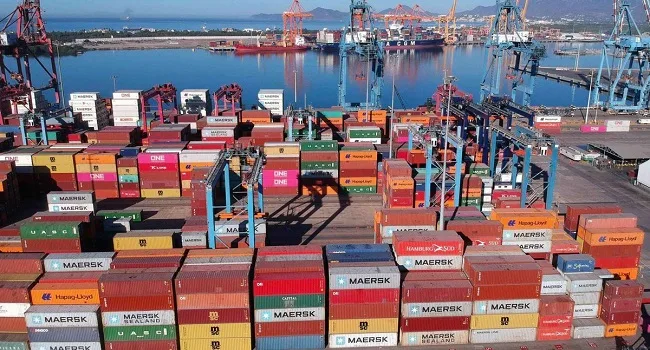The Federal Government has intensified efforts to fully implement the National Single Window (NSW) at Nigeria’s ports by 2026, in a bid to streamline port operations and enhance trade efficiency.
Vice President Kashim Shettima said the initiative is designed to harmonise port documentation, minimise human contact, and improve transparency in cargo clearance processes.
Describing the project as a “game changer” for the maritime sector, Shettima emphasised that it would significantly reduce cargo clearance time and boost Nigeria’s trade competitiveness.
Speaking at the second meeting of the Ports and Customs Efficiency Committee held at the Presidential Villa, the Vice President revealed that the government aims to cut the average cargo clearance time to under seven days by the end of 2026.
“Our goal is to position Nigerian ports among the top three most efficient trade gateways in Africa,” he stated, adding that the rollout of the National Single Window in the first quarter of 2026 will transform port operations nationwide.
Shettima lamented that the cost of clearing goods in Nigeria is 30 per cent higher than in many regional counterparts, noting that inefficiencies at the ports have discouraged investment, increased consumer prices, and weakened export competitiveness.
“Our ports record cargo dwell times 475 per cent above the global average benchmark. We cannot afford to continue down this path,” he warned.
To address these challenges, the Vice President directed the Nigerian Ports Authority (NPA), Nigeria Customs Service (NCS), NAFDAC, SON, and other relevant agencies to develop a comprehensive roadmap for an effective weights and measures framework.
He explained that the framework would ensure fairness in trade, guarantee the verification of weighing equipment, and protect consumers from fraudulent practices. “Accurate measurement,” he said, “is the bedrock of efficiency and global trade standards.”
Boosting efficiency and collaboration
Shettima expressed optimism that the pending Executive Order on Joint Physical Inspection, currently awaiting President Bola Tinubu’s approval, would eliminate long-standing bottlenecks in port operations.
“It marks the dawn of a new era where agencies work together and systems speak a common language,” he noted, stressing that the order would promote predictability, transparency, and speed in cargo handling.
He urged all port-related agencies to operate as a unified value chain, emphasising that the era of working in silos was over.
“No reform succeeds without ownership,” he said. “Inter-agency rivalry must give way to collaboration. Our efficiency depends on how well we work together.”
Stakeholders commit to reforms
The Director-General of the Presidential Enabling Business Environment Council (PEBEC), Zahrah Audu, highlighted the negative impact of inefficient port operations on Nigeria’s Ease of Doing Business rankings. She called on stakeholders to commit to continuous improvements, noting that the committee’s work reflects a shared vision to make Nigeria’s ports globally competitive.
Similarly, the Managing Director of the NPA, Abubakar Dantsoho, stressed that true efficiency can only be achieved through cooperation and partnership.
“Until there is collaboration, you cannot achieve efficiency at the ports,” he said, noting that the Ports and Customs Efficiency Committee has already made progress through joint inspections and coordinated agency efforts.
Dantsoho outlined technology adoption, infrastructure upgrades, and human capacity development as key priorities to enhance port competitiveness and ensure Nigeria remains a strong player in regional and global trade.


